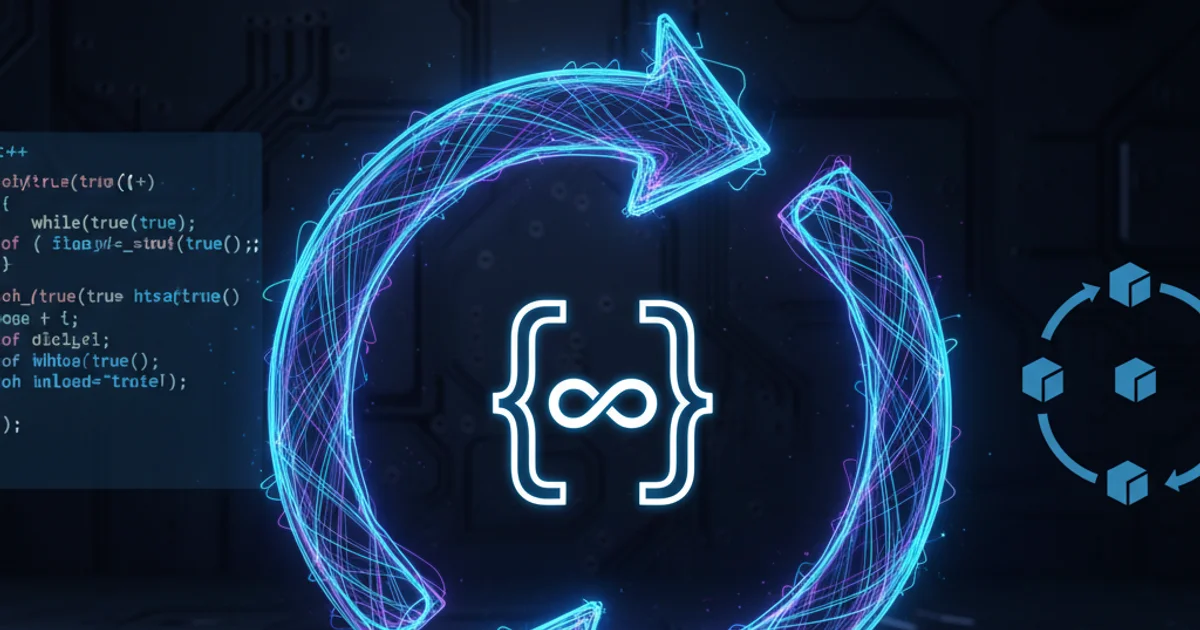Endless loop in C/C++
Categories:
Understanding and Preventing Endless Loops in C/C++

Explore the causes, consequences, and effective strategies for identifying and resolving infinite loops in C and C++ programming.
An endless loop, also known as an infinite loop, is a sequence of instructions in a computer program that repeats indefinitely. This occurs when the loop's termination condition is never met, causing the program to execute the same block of code repeatedly without progressing. While sometimes intentional (e.g., in embedded systems or event-driven programming), unintentional endless loops are a common bug that can lead to program unresponsiveness, resource exhaustion, and crashes. This article delves into the common causes of endless loops in C/C++ and provides practical methods for prevention and debugging.
Common Causes of Endless Loops
Endless loops typically arise from logical errors in how loop conditions are defined or how variables affecting those conditions are manipulated. Understanding these common pitfalls is the first step towards writing robust code.
flowchart TD
A[Start Loop] --> B{Condition Met?}
B -- No --> C[Execute Loop Body]
C --> B
B -- Yes --> D[Exit Loop]
style B fill:#f9f,stroke:#333,stroke-width:2px
style C fill:#bbf,stroke:#333,stroke-width:2px
style D fill:#afa,stroke:#333,stroke-width:2pxBasic loop flow illustrating the condition check
Here are some of the most frequent reasons for unintended infinite loops:
Incorrect Loop Condition
The most straightforward cause is a loop condition that always evaluates to true. This can happen due to a simple logical error or an oversight in how the condition is constructed.
int i = 0;
while (i < 10) {
// Oops! i is never incremented
// This loop will run forever
std::cout << "Looping...\n";
}
Example of an endless while loop due to missing increment.
for (int j = 0; j < 5; /* Missing increment */) {
printf("Still looping...\n");
}
Example of an endless for loop with a missing increment.
Floating-Point Precision Issues
When using floating-point numbers in loop conditions, precision issues can lead to unexpected behavior. Due to the way floating-point numbers are represented, a value that you expect to reach a specific threshold might never quite get there, or it might overshoot it.
double x = 0.0;
while (x != 1.0) { // Dangerous: x might never be exactly 1.0
x += 0.1;
std::cout << "x: " << x << "\n";
if (x > 10.0) break; // Emergency break for demonstration
}
An endless loop caused by floating-point comparison.
== or !=) with floating-point numbers in loop conditions. Instead, use a tolerance or range-based comparison (e.g., x < 1.0 - epsilon or abs(x - 1.0) > epsilon).External Factors and Race Conditions
In multi-threaded or event-driven programming, an endless loop can occur if a condition relies on an external event or a variable modified by another thread, and that event or modification never happens as expected. Race conditions can also lead to unpredictable loop termination.
sequenceDiagram
participant ThreadA
participant ThreadB
ThreadA->>ThreadA: Start Loop (while condition_var)
ThreadA->>ThreadA: Check condition_var
alt condition_var is true
ThreadA->>ThreadA: Continue Loop
ThreadB->>ThreadB: Perform work
ThreadB->>ThreadA: (Missed) Update condition_var
else condition_var is false
ThreadA->>ThreadA: Exit Loop
end
Note over ThreadA,ThreadB: If ThreadB fails to update condition_var,
Note over ThreadA,ThreadB: or ThreadA checks before update, loop is infinite.Sequence diagram illustrating a potential race condition leading to an endless loop.
Debugging such issues requires careful synchronization mechanisms (mutexes, semaphores) and thorough testing of concurrent execution paths.
Debugging and Prevention Strategies
Preventing endless loops is primarily about careful design and rigorous testing. When they do occur, effective debugging techniques are crucial.
1. Review Loop Conditions
Carefully examine the loop's entry and exit conditions. Ensure that there's a clear path for the condition to eventually become false. For for loops, verify initialization, condition, and increment/decrement parts.
2. Use Debuggers
Step through your code line by line using a debugger (e.g., GDB, Visual Studio Debugger). Observe the values of variables involved in the loop condition and within the loop body. This will quickly reveal if a variable isn't changing as expected.
3. Add Print Statements
Insert printf or std::cout statements inside the loop to print the values of critical variables and the loop counter. This provides runtime insight into the loop's progress and can help pinpoint where the logic deviates.
4. Implement Timeouts/Counters
For loops that interact with external resources or in situations where an infinite loop is hard to predict, consider adding a maximum iteration counter or a timeout mechanism. If the loop exceeds a reasonable number of iterations, break out and log an error.
5. Static Analysis Tools
Utilize static analysis tools (e.g., Clang-Tidy, PVS-Studio) which can often detect potential infinite loop patterns or uninitialized variables that might lead to them.
while(true) in embedded systems), ensure there's an explicit break or return statement within the loop body that can be triggered by specific conditions or events to prevent resource starvation.